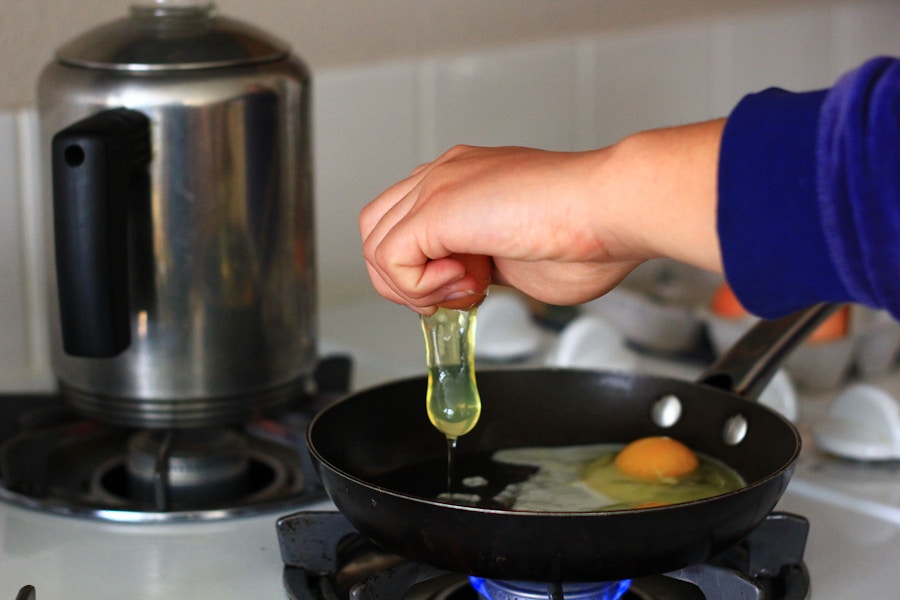Eggs have some insanely high prices in the past few months, even with the best egg deals and coupons. Due to the rising cases of avian influenza — the bird flu — egg producers have been seeing effects on their hens' production. This, in turn, has been causing shortages and some hefty price increases.
The U.S. Bureau of Labor Statistics reports that the average price of a dozen Grade A large eggs was $6.23 per dozen in March 2025, setting a new record. This was 29% higher than the previous record of $4.82 in January 2023. Relief could be coming, though. Wholesale prices on eggs have recently been dropping every week, according to the USDA, although there was a slight uptick last week due to Easter demand. If those wholesale prices (the prices stores pay their egg suppliers) continue to drop again after Easter, that could help ease sticker prices shoppers pay.
Every week, we do price comparisons at several national store chains to find the lowest egg prices. Read on for what we found the week of April 25. Keep in mind that sale prices and location can affect these comparisons, but this is a good resource when choosing where to shop for these everyday essentials.
Download The Krazy Coupon Lady app or text HACKS to 57299 for the latest money-saving tips, deals, and coupons.
Best Egg Coupons Right Now
Aisle has a rebate for a free Just Egg plant-based product, available to use at multiple stores. To get started, enter your phone number on the rebate website to get a text with the offer. Reply to the text with a picture of your receipt for reimbursement via either PayPal or Venmo.
Eggland's Best has a $4 rebate when you buy 12 select products. Plus, check out a $2 rebate on Nellie's and Pete & Gerry's eggs and a $1 printable coupon for Vital Farms on our Egg Coupons and Deals page. You can also find the $1 coupon for Vital Farms in your Target Circle app.
Top 6 Stores With the Cheapest Eggs — No Sales or Coupons Needed
Prior to 2022, the highest price of a dozen eggs hit $2.97 in September 2015, according to the Bureau of Labor Statistics. Then in January 2023 we hit an all-time high, with the average prize of a dozen Grade A large eggs at $4.82 (remember that?). Prices dropped again in the summer of 2023, but they’ve been steadily on the rise since December 2023, with an average price of $3.65 in November 2024. We hit a new record at an average of $6.23 per dozen nationwide in March 2025, the last time the Bureau of Labor Statistics updated its numbers.
BUT we're actually starting to see some price drops on store shelves. Here are the top six stores with cheap eggs right now. (And spoiler alert: Trader Joe’s almost always has the best price in my area.) For the week of April 25, we found an average price per egg of $0.34, down $0.04 from last week.

Trader Joe's
They're pretty much always the best. Right now in my area near Pittsburgh, Pennsylvania, you can get a dozen cage-free large brown or white eggs for $3.49 at Trader Joe's. This works out to $0.29 per egg and is the cheapest I could find anywhere without a sale or coupon. As of Feb. 11, 2025, Trader Joe's placed a limit of one dozen per customer. But my local store confirmed that they get eggs delivered every day by 8 a.m., and their prices haven't increased at all in 2025.
Walmart
We finally saw a price drop at Walmart. Over this past week a dozen large white eggs went from $4.97 to $4.47, or $0.37 per egg.
This is also my cheapest place to shop for Nellie's and Vital Farms to use my coupons and rebates. Nellie's drops to just $3.31 after the $2 rebate, and Vital Farms is $4.92 after the printable coupon.
Sam's Club
My local Sam's Club has had eggs back in stock since March 26, 2025. I can grab the 24-count Cage Free Grade A Large eggs for $7.62 — or $0.32 per egg — working out to $3.81 per dozen which is a very competitive price.
You have to be a Sam's Club member to get this price, and you'll only get it in-club. Selection and price vary by location.
Costco
Costco hasn't had eggs on their website since mid-March. But if you visit in-club, you'll likely find them on the shelves. I found an 18-count of Large Grade A eggs for $6.77 — $0.38 per egg, or $4.51 per dozen.
Again, like Sam's, you'll need to be a member to get this price when they're in stock. Learn more about Costco membership cost and benefits. As of Feb. 11, 2025, Costco limits customers to three packages of eggs per person. (If you can find them in stock, that is.)
KCL TIP: If you don't have a Costco membership, you can still get their eggs using Instacart. Even with the convenience upcharge (which is 6.35%), you'll pay $7.20 for 18, which is $0.40 per egg or $4.80 per dozen, still less than the price per dozen at Walmart, Aldi, and Target.
Target
We've also finally got a $0.50 price drop at Target this week. You can now get a dozen Grade A large eggs for $4.49, or $0.37 per egg, matching Walmart's prices.
Target was surprisingly competitive in the egg price game in my area in early 2025. Then in February 2025, prices went up by $2 per dozen in a month. On March 28, they dropped by $1 to $4.99, and held steady for several weeks.
Aldi
Here is some good news. Aldi's Grade A eggs dropped by $1 this week. They're currently $3.99 — or $0.33 per egg — the week of April 25. This is the lowest we've seen them since February of this year.
During the last bird flu outbreak, Aldi's Goldhen brand was nearly always in second place behind Trader Joe's. This year, though, they've been quite a bit more expensive, which makes this price drop a great sign.
KCL TIP: Don't assume Grade A white eggs are cheapest right now. Do some price comparisons, because cage-free and free-range are actually a better price — and likely will be until we see prices normalize again.
Why are eggs so expensive?
The current higher prices are related to another round of bird flu affecting egg production — much like we saw in 2023. We have read several reports from the USDA stating that wholesale prices are decreasing, but we're still seeing high prices on grocery store shelves. Why?
Well, that's up to the stores themselves. Many grocers are hesitant to drop prices — causing an increase in demand — when they are still worried about their egg supply. The longer we go without any new bird flu cases, the better our chances for price drops.
You may also notice that your regular dozen white eggs are still more expensive than a dozen of the organic, pasture-raised variety. Why is that? It seems that many of the standard Grade A eggs have been hit harder with a supply problem, so as their prices rise, the usually more-expensive fancy eggs have (for now at least) become a better deal.
What do the different types of eggs mean?

Eggs are no longer just white ovals in a styrofoam carton. There are organic eggs, cage-free eggs, free-range eggs, and more. But what does it mean? Let’s break it down.
Grade A, AA, B
The grade on egg cartons is assigned by the USDA and is based on the egg’s interior quality as well as its shell condition. Grade AA eggs have thick and firm whites and yolks that are round and defect-free. If you look at Grade A eggs, they have similar yolks but their whites may not be as firm. Next up is Grade B, which is assigned when the egg’s whites are thinner, the yolks are less round, and the shells have stains. Grade B eggs are usually used to make egg products and aren't often sold in stores.
Organic Eggs
The term organic is regulated by the USDA. In regard to eggs, it means that the chickens are free-range and fed a 100% organic diet free of hormones, antibiotics, arsenic, and by-products. These eggs must also come from hens that have access to graze outdoors at least 120 days per year.
Cage Free
So what are cage-free eggs? Cage-free quite literally means that the hens aren't kept in cages. It doesn’t mean, however, that their living facilities are top-notch. They could still be in cramped quarters with very little room to live. This term isn't regulated, so it’s hard to say.
Free Range
Free-range hens have access to the outdoors, but whether they’re roaming free in a field or just able to visit a screened-in porch will depend on the facility.
Pasture Raised
If you prefer your eggs to come from a hen with ample room to roam, pasture-raised eggs are a good option. This means that the chickens live outdoors and eat a natural diet of seeds, plants, and insects, which to some result in the best tasting eggs. The term isn't regulated by the FDA, so check that these eggs are Certified Humane and American Humane Certified. If you see this certification, a third party has determined that the hens have a specific amount of pasture land to roam and sufficient natural foods.
Hormone Free
While seeing these labels on a package may bring you comfort, don’t rely too heavily on these statements. The FDA has banned the use of hormones for poultry production, so this is true for all eggs.
Related: Where to Find Cheap Butter
So what type of eggs should I buy?

To be perfectly honest, it’s up to you. All eggs are a great source of protein and vitamin D. You shouldn't avoid eggs in your balanced diet just because your budget doesn’t have room for high-end organic brands.
But if you do want to shop for eggs with denser shells and round yellow yolks, look for pasture-raised, organic eggs. According to experts at the Cleveland Clinic, these eggs have lower cholesterol content and darker, richer yolks.
Related Reading:



































Tell us what you think